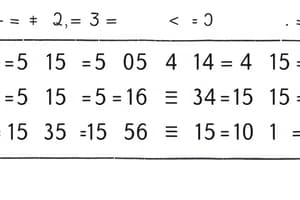Podcast
Questions and Answers
What is the fundamental operation that involves taking away a number from another?
What is the fundamental operation that involves taking away a number from another?
- Addition
- Multiplication
- Division
- Subtraction (correct)
If you have five apples worth $2 each, what is the result of the multiplication operation?
If you have five apples worth $2 each, what is the result of the multiplication operation?
- $7
- $8
- $10 (correct)
- $3
What mathematical concept does the game 'Guess Who Lost One Leg?' help children understand?
What mathematical concept does the game 'Guess Who Lost One Leg?' help children understand?
- Place Value
- Rounding Off Decimals (correct)
- Multiplication
- Subtraction
What does division reveal?
What does division reveal?
Which operation involves finding how many times one number fits within another?
Which operation involves finding how many times one number fits within another?
What is the core idea behind learning math through games and activities?
What is the core idea behind learning math through games and activities?
What is a key benefit of solving the Chocolate Bars Puzzle?
What is a key benefit of solving the Chocolate Bars Puzzle?
How does playing Math Dice encourage children to work together?
How does playing Math Dice encourage children to work together?
What is the significance of identifying patterns in mathematics?
What is the significance of identifying patterns in mathematics?
What is a characteristic of the sequence \[2, 4, 6, \cdots\]?
What is a characteristic of the sequence \[2, 4, 6, \cdots\]?
What makes mathematics fascinating despite its reputation for being challenging?
What makes mathematics fascinating despite its reputation for being challenging?
How does problem-solving extend beyond individual tasks in mathematics?
How does problem-solving extend beyond individual tasks in mathematics?
Flashcards are hidden until you start studying
Study Notes
Math: Discovering Fun through Numbers
Exploring math can sometimes feel like embarking on a grand adventure – one where we boldly venture into the vast world of numbers and their relationships. In this article, let's dive deep into playing with numbers. We’ll discover some fundamental concepts, games, and principles that will ignite your curiosity and inspire you to learn more about this intriguing subject.
Basic Operations
At its core, math revolves around four foundational operations: addition, subtraction, multiplication, and division. Addition is adding two numbers together, such as (7 + 3 = 10). Subtraction involves taking away a number from another, such as (9 - 4 = 5). Multiplication means finding how many times one number fits within another; for example, if I have five apples worth $1 each, then (5 \times 1 =) $5. Division reveals how often one quantity appears inside another; for instance, dividing 10 by 2 gives us (10 \div 2 = 5), meaning there are five groups of two.
Games & Activities
Learning math doesn’t always require textbooks or pencils! There are several engaging games and activities that help bring abstract mathematical ideas to life:
-
Guess Who Lost One Leg? – This popular game introduces children to place value while also teaching them the concept of rounding off decimal points. By asking questions related to missing digits, players improve their understanding of whole numbers.
-
Chocolate Bars Puzzle – Similar to Sudoku, this math puzzle challenges problem solvers to arrange chocolate bars in rows based on given constraints involving addition and multiplication. Solving puzzles helps strengthen mental arithmetic skills.
-
Counting Money – A classic activity that provides practice with addition, multiplication, and division in real-world scenarios. For example, figuring out the total cost of shopping items and calculating change requires students to apply these basic math operations.
Problem solving isn't just confined to individual tasks either—it extends to collaborations too! Games like Math Dice encourage teamwork among children who roll dice and use their knowledge to perform various calculations. This approach fosters effective communication and critical thinking abilities, enabling individuals to work cohesively toward common goals.
Pattern Recognition
Identifying patterns has played a significant role throughout mathematics history, from Pythagoreans exploring geometric progressions to modern mathematicians studying fractals. Interpreting numerical sequences enables us to predict future terms and understand complex theories better.
For simplicity, let's look at a sequence formed using consecutive even numbers beginning with 2: [2,\ 4,\ 6,\ \cdots] As you notice, every term increases by 2 compared to the previous one. Exploring similar trends found across different numerical patterns cultivates curiosity and reinforces our ability to make connections between seemingly unrelated phenomena.
By now, you might see why math remains fascinating despite being considered challenging for some people. It offers endless opportunities for exploration and discovery, pushing boundaries beyond the realm of mere computation. Whether you enjoy playing with numbers themselves, searching for hidden connections, or helping others find the joy in learning, mathematics surely has it all. And remember, regardless of skill level or age, everyone has something valuable to contribute to this exhilarating journey called math.
Studying That Suits You
Use AI to generate personalized quizzes and flashcards to suit your learning preferences.




